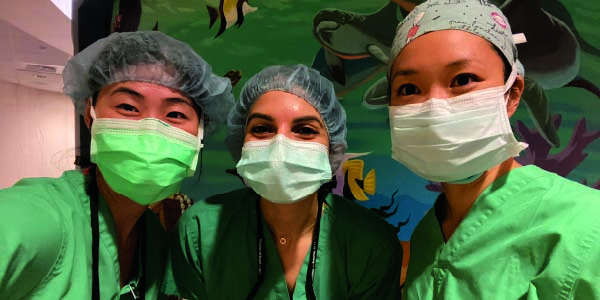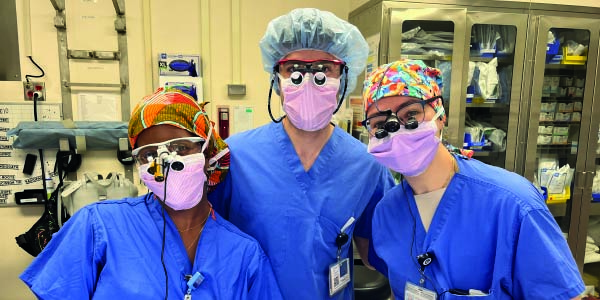








Clinical rotations are designed to offer a step-graded advancement to the ultimate goal of independent practice of ophthalmology with all of its technical, moral, and ethical responsibilities. Rotations designed with surgical development in mind include assigned OR time through all three years of residency.
The exposure to patients with subspecialty problems is not limited to just the time spent on a specific block rotation. These patients are seen in all subspecialties during all three years of residency while also on Hillcrest and VA rotations.

“Ophthalmology Boot Camp” is held the first of July, right after our GME orientation, and can last up to two weeks, depending on the calendar. Residents are introduced to a variety of ancillary testing as well as to practical skills needed to begin work in the clinic. During Boot Camp, new residents on call will “shadow” a senior resident to familiarize themselves with on-call procedures.
First-year residents see a variety of patients during rotations at Hillcrest, Shiley, and the VA.

The resident is sent to the Wills Board Review Course in early March.
Second-year residents have rotations in the five sub-specialties of Cornea, Glaucoma, Oculoplastics, Pediatric Ophthalmology, and Retina, plus an Elective/Neuro rotation.
Third-year residents are sent to the American Academy of Ophthalmology’s annual meeting.
Although residents are brought into surgery early on in their training, this is very much a surgical year, with the resident refining surgical skills in all areas and building on foundations from their first and second year.
The information contained in this online site is intended to provide accurate and helpful health information for the general public. It is made available with the understanding that the author and publisher are not engaged in rendering medical, health, psychological, or any other kind of personal professional services on this site. The information should not be considered complete and does not cover all diseases, ailments, physical conditions or their treatment. It should not be used in place of a call or visit to a medical, health or other competent professional, who should be consulted before adopting any of the suggestions in this site or drawing inferences from it.
The information about drugs contained on this site is general in nature. It does not cover all possible uses, actions, precautions, side effects, or interactions of the medicines mentioned, nor is the information intended as medical advice for individual problems or for making an evaluation as to the risks and benefits of taking a particular drug.
The operator(s) of this site, and the publisher, specifically disclaim all responsibility for any liability, loss or risk, personal or otherwise, which is incurred as a consequence, directly or indirectly, of the use and application of any of the material on this site.
Click Here To Accept